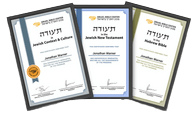The Deeper Meaning of Manna
At the outset of Exodus 16, the Israelites complain to Moses and Aaron, saying,
“Would that we had died by the hand of the Lord in the land of Egypt, when we sat by the meat pots and ate bread to the full, for you have brought us out into this wilderness to kill this whole assembly with hunger” (Exodus 16:3).
In response, God rains down bread from heaven for them. When the people leave leftovers despite Moses’ command to the contrary, the manna begins to “stink” (בָּאַשׁ; ba’ash)—a smell that recalls similar odors from Egypt.
The Stench of Egypt
For instance, when Pharaoh makes the Hebrew slaves create bricks without straw, the foremen of the Israelites say to Moses and Aaron,
“The Lord look on you and judge because you have made us stink (בָּאַשׁ; ba’ash) in the sight of Pharaoh and his servants, and have put a sword in their hand to kill us” (Exodus 5:21).
After the first plague, “the fish in the Nile died, and the Nile stank (בָּאַשׁ) so that the Egyptians could not drink water from the Nile” (7:21; cf. 7:18). Similarly, after the second plague, dead frogs gathered in heaps, “and the land stank (בָּאַשׁ)” (8:14). The odor of Egypt returns when the manna begins to stink in the wilderness.
Trust and Obedience
Since the manna goes sour after the Israelites disobey Moses, the smell would have provided the people with an important lesson. The heavenly bread had arrived after Israel expressed a wish to return to Egypt, where they imagined they had free access to “meat pots” and eaten “bread to the full” (16:3). Yet, the stinking bread from heaven would have reminded the grumbling Israelites of how bad Egypt had been for them, and how much better they could have it if they would put their trust in God. Indeed, when the Israelites finally follow Moses’ instructions, the manna “did not stink” anymore (16:24), which would have indicated that a life of obedience to the Lord is sweet in comparison to the stench of slavery in Egypt.
Discover more profound lessons of the Bible. Learn more about unseen connections, meanings, hints, and links, where the Bible tells a much deeper and more nuanced story than the one we see in translation. Join our learning community and dive into the Jewish Context and Culture Program and encounter the original text of Israel’s Scriptures.









